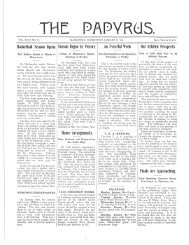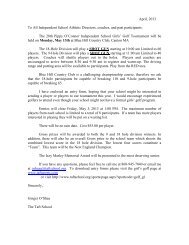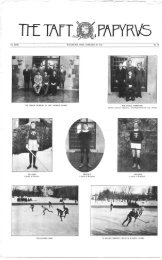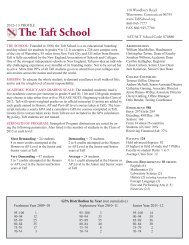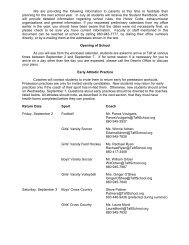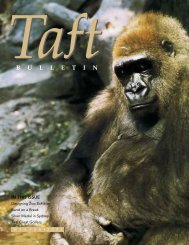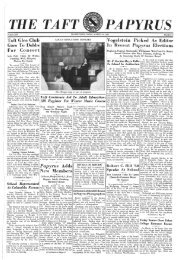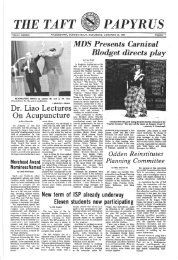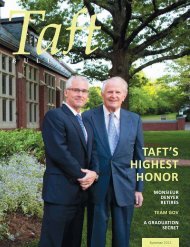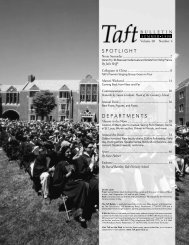Download - The Taft School
Download - The Taft School
Download - The Taft School
You also want an ePaper? Increase the reach of your titles
YUMPU automatically turns print PDFs into web optimized ePapers that Google loves.
Stevan Dedijer, Class of 1930<br />
Innovator, adventurer, researcher<br />
tales of a TAFTIE<br />
By Brady Dennis<br />
Sources:<br />
My Life of Curiosity and<br />
Insights by Stevan Dedijer<br />
(edited by Carin Dedijer<br />
& Miki Dedijer, 2009)<br />
Interview with<br />
Miki Dedijer, Dec. 2011<br />
Obituary of Stevan<br />
Dedijer, David Bloom,<br />
<strong>The</strong> Guardian, U.K.<br />
Aug. 31, 2004<br />
“Innovator,<br />
adventurer, researcher:<br />
Stevan Dedijer”<br />
www.lunduniversity.lu.se<br />
“<strong>The</strong> Father of<br />
Business Intelligence”<br />
by Patrick Marren,<br />
Journal of Business<br />
Strategy (Nov. 2004)<br />
“A Damn Place<br />
Called Bastogne”<br />
by Stevan Dedijer<br />
(<strong>Taft</strong> Bulletin, Winter 1996,<br />
originally appeared in the<br />
Princeton Alumni Weekly)<br />
PHOTO:<br />
Per Lindström/<br />
Lunds universitet<br />
What successful <strong>Taft</strong>ie,<br />
no longer living, would<br />
you like to see profiled<br />
in this space? Send<br />
your suggestions to<br />
juliereiff@taftschool.org<br />
36 <strong>Taft</strong> Bulletin Winter 2012<br />
Stevan Dedijer lived a life that even the daydreaming Walter<br />
Mittys of the world might have a hard time imagining.<br />
He studied physics at Princeton, reported for Newsweek,<br />
edited a communist newspaper, underwent training as a<br />
U.S. intelligence agent, jumped out of planes over Europe as<br />
a member of the 101st Airborne, oversaw a Yugoslav atomic<br />
research program and became a university professor. He<br />
founded a research policy institute and pioneered a field of<br />
study known as “business intelligence.”<br />
He lived in Copenhagen and Calcutta, in Paris and<br />
Pittsburgh and Rome. He lectured at Harvard and Yale and<br />
Stanford. He married three times, had four children. At<br />
nearly 70, he took up skydiving in part to prove to people<br />
deciding whether to fund his research that he still possessed<br />
vitality and daring, and that he had no intention of retiring.<br />
“I have lived intensely, changing countries, cultures,<br />
languages, ideologies, beliefs, professions and families,”<br />
Dedijer wrote in an autobiography edited by his wife and<br />
published after his death in 2004, just shy of his 93rd birthday.<br />
“I tended to suddenly jump from one social system to<br />
another, like jumping from a place without a parachute.”<br />
In some ways, his constant globetrotting and his hunger<br />
for adventure made him a sort of loner, a man always on his<br />
way someplace else. By the same token, his frequent jumps<br />
to different places and cultures allowed him to bear witness<br />
to some of the defining moments in modern history.<br />
“He was a lovely and a maddening man,” said Miki<br />
Dedijer, Stevan’s youngest son, a former science journalist<br />
who lives in Sweden. “He showed very little fear, and<br />
loved doing things his way. I think he needed some fear,<br />
danger, challenge to feel fully alive.”<br />
Dedijer was born in Sarajevo and “spent much of his<br />
early childhood on the run,” according to an account by<br />
the Guardian, because his father belonged to a secret military<br />
group linked to the assassination of Archduke Franz<br />
Ferdinand II, which helped spark the First World War.<br />
After attending a boarding school in Rome as a<br />
teenager, Dedijer arrived at <strong>Taft</strong> in 1929. All he knew of<br />
Connecticut was what he had read in James Fenimore<br />
Cooper’s <strong>The</strong> Last of the Mohicans. Dedijer barely had arrived<br />
in the United States when the stock market collapsed<br />
and the nation hurtled toward a crippling depression.<br />
“This social disaster was a strange, provocative<br />
mystery for me,” he later wrote, saying the experience<br />
shaped his turn toward Marxism.<br />
Largely shielded from the economic calamity in the<br />
safe environs of Watertown, Dedijer reveled in his newfound<br />
adventures at <strong>Taft</strong>. He honed his English skills and<br />
fell in love with American girls. He marveled at the size of<br />
an Idaho potato. He played soccer and basketball and ran<br />
track. He sang in the glee club. He went by Steve.<br />
After Princeton, he worked as a business reporter for<br />
Newsweek, headed to Pittsburgh to edit a weekly communist<br />
paper that served Serbian laborers in the western<br />
Pennsylvania steel mills. He signed up for the OSS (the<br />
predecessor to the CIA) but didn’t last long given his<br />
political sympathies. He later became a paratrooper and<br />
jumped over Europe as bodyguard to Maxwell Taylor,<br />
commanding officer of the 101st Airborne and later the<br />
head of the Joint Chiefs of Staff under President Kennedy.<br />
In 1952, Dedijer was appointed director of<br />
Yugoslavia’s Nuclear Institute, but he became increasingly<br />
disillusioned with the communist regime of Josip<br />
Broz Tito and resigned. In 1961, he moved to Sweden<br />
and joined the faculty at Lund University. <strong>The</strong>re, the<br />
ceaseless traveler finally settled in.<br />
In the coming decades, Dedijer founded the university’s<br />
research policy institute, published hundreds of<br />
academic papers and developed the field of “business<br />
intelligence,” which centers around collecting, analyzing<br />
and applying strategic information to help make<br />
the wisest business decisions. It is not cloak-and-dagger<br />
corporate espionage, as the name might imply—Dedijer<br />
abhorred such practices—but rather gaining advantage by<br />
more intelligently analyzing readily available information.<br />
He continued to travel widely, to write and lecture<br />
frequently. In the final weeks of his life, he returned to his<br />
home in Dubrovnik, a two-room apartment overlooking<br />
the Adriatic Sea. Over the entrance were carved the words,<br />
“I have little, I need little. May God protect what little I<br />
have.” Even as he lay dying, his son recalls, Dedijer would<br />
gaze out over the ancient city and proclaim, “I’m the luckiest<br />
man alive. I’m richer than Onassis. Look at this view.”<br />
In his final journey, the relentless wanderer found peace.<br />
“Midst its endless wars and troubles I have had a<br />
wonderful life in all parts of the planet, tackling difficult<br />
dreams,” he had written in his yet-to-be published autobiography.<br />
“I belonged everywhere and nowhere.” j<br />
Brady Dennis is a staff writer for the Washington Post.



